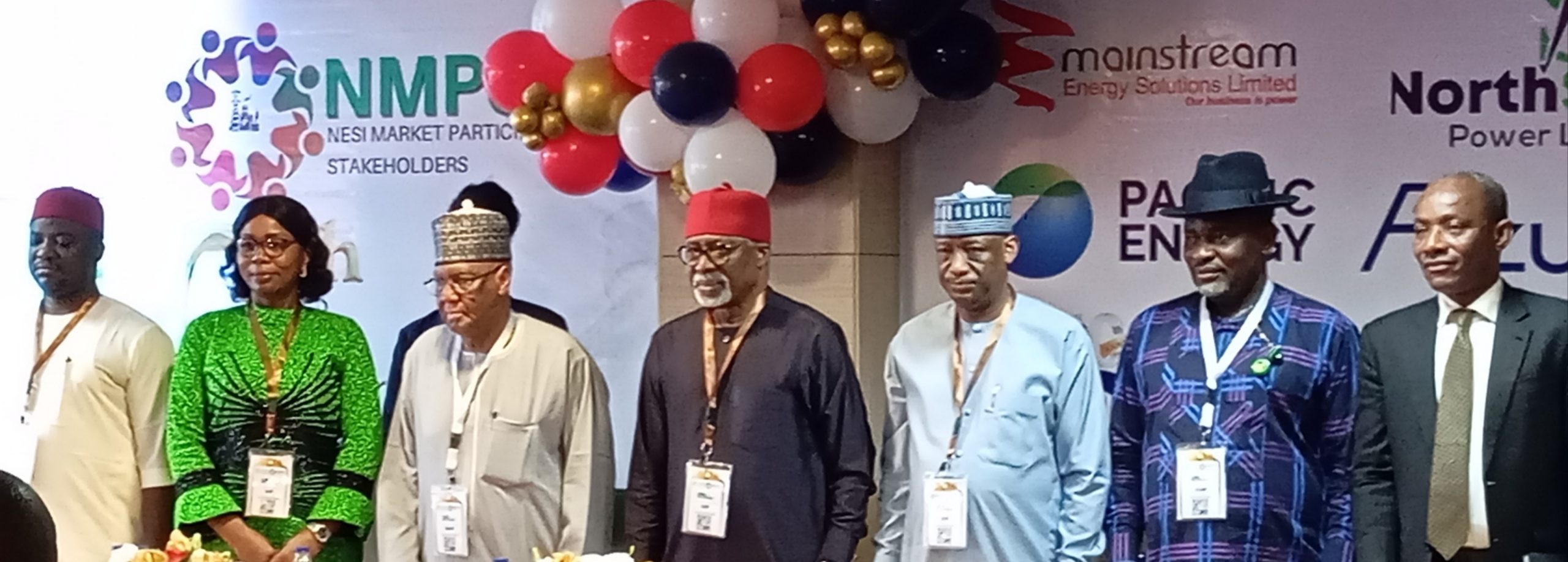Senate Committee Chairman on Power, Senator Enyinnaya Abaribe (Center) flanked by Board Chairman of APGC, Col. Sani Bello (left) and the Managing Director/Chief Executive Officer, Nigerian Independent System Operator (NISO), Engr. A. B. Mohammed (Right) and others at the 10th anniversary celebration of APGC. Photo credit: OPTIMUM TIMES, 27/10/2025.
The Chairman Senate Committee on Power, Senator Enyinnaya Abaribe, has allayed fears being generated by the ongoing amendment of the Electricity Act, 2023, assuring that there is no fondamental changes being made, except effecting corrections observed in the current Act to ensure cohesion with the objectives and intentions of the Act to avoid constitutional conflicts.
He explained that such errors if left uncorrected will set the Act and the sub-nationals (States) on one hand in conflict with the Constitution and the Federal government.
Senator Abaribe who spoke at the Celebration of the 10th anniversary of the Assassination of Power Generation Companies (APGC), joined other stakeholders in the Nigerian Electricity Supply Industry (NESI) present at the two-day event, to applaud APGC and its Chief Executive Officer, Dr. Joy Ogaji, for the achievement of “significant milestone not only for APGC but for the entire Nigerian Electricity Supply Industry.”
Abaribe cited that one of the critical errors lately discovered in the EA 2023 include the provision that “no law made by the state can be challenged anywhere”, which he said runs contrary to provisions of the Constitution which provides that any law which conflicts with the Constitution is null and void.
Speaking on the theme of the event “A Decade of Powering Progress: Driving Nigeria’s Energy Transformation,” Abaribe said: “We recognize that this anniversary represents far more than the passage of time. It symbolizes ten years of unwavering commitment, persistent advocacy, and collaborative effort toward building a sustainable and competitive electricity market in our nation.
“The Association of Power Generation Companies has distinguished itself as the unified and authoritative voice of Generation Companies in Nigeria, consistently championing the interests of the power generation sector while working in harmony with government agencies, regulatory bodies, and development partners.
“The transformation we have witnessed in the Nigerian power sector over the past decade has been both challenging and inspiring. APGC has navigated complex regulatory environments, advocated for progressive policies, and served as a bridge between Generation Companies and critical stakeholders across the electricity value chain.
“Through persistent engagement and strategic advocacy, the Association has contributed significantly to shaping discourse around energy security, investment attraction, and operational sustainability within our power generation landscape.”
Senator Abaribe however, regretted that despite the achievements, the issues of infrastructure deficit, tariff structures, gas supply constraints, and financial sustainability remain pressing concerns that demand continued collaborative action.
On his part, the Chairman, Board of Trustees of the APGC, Col. Sani Bello (Rtd), recalled the mission of the APGC saying, “Our mission has always been clear: to empower members through knowledge sharing, foster collaboration and best practices, and drive innovation and investment that promote efficient, eco-friendly, and reliable power generation across Nigeria.”
Col. Bello noted that under the dedicated leadership of Dr. (Mrs.) Joy Ogaji, and the board supervising the role, the Association has advocated tirelessly for a fair and transparent electricity market structure; engaged with regulators, policymakers, and financiers to address liquidity challenges that have constrained GenCos’ operations; promoted the optimisation of generation capacity across hydro and thermal plants;
championed discussions around gas availability and the sustainability of energy investments; and served as a bridge between government and private investors, fostering dialogue instead of division.
Also speaking in a keynote address, the Managing Director/Chief Executive Officer, Nigerian Independent System Operator (NISO), Engr. A. B. Mohammed, noted that APGC has grown to become a recognized voice for generation companies, a partner in national dialogue, and an engine for collaboration across NESI.
He reminded members of the APGC to be mindful of their respective responsibilities, saying that while the APGC has an essential role in shaping discourse and fostering unity among GenCos, it is important to draw clear boundaries between what the Association can legitimately do and what remains the exclusive responsibility of its individual members.
The NISO Managing Director cited that such individual responsibilities include Compliance Obligations,
Data and Information Sharing; Market Settlements and Performance Accountability, among others.
He maintained that in essence, the Association can continue to amplify the voice of GenCos, but it cannot substitute their compliance responsibilities.
On his part, the former Chairman of Nigeria Electricity Regulatory Commission (NERC), Dr. Sam Amadi raised concerns about the purported ongoing amendment of the EA 2023, saying that it is too hasty to begin to amend an Act which has not really been tested and its provisions not yet implemented.
According to him, “We should not be too inoculated around failure. That once we start an experiment, we try to go back again, back and forth. If there’s trouble, we should think about revision and imagine, not destruction and reconstruction.
“Why do I say this is very important? Nigerian electricity sector is tied to politics too much. If there’s a problem, it really fits into policy making. They start looking for solutions, and the solution becomes worse than the problem.
“I think we should have some stability to allow things to work and learn from the errors. And then build revisions, keep tweaking the model until we get the solution.”

 Business News1 week ago
Business News1 week ago
 News7 days ago
News7 days ago
 News1 week ago
News1 week ago

























